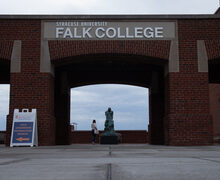Pan Am 103 : Families of victims, SU community react to al-Megrahi’s death
Ariana Yuen, a 2011-12 Remembrance Scholar, speaks at the rose laying ceremony during Remembrance Week on Nov. 11, 2011. Abdelbaset al-Megrahi, the only person convicted in the 1988 Pan Am Flight 103 bombing over Lockerbie, Scotland, died on Sunday.
There are moments you remember exactly where you were. Precisely how you heard.
Radio reception was always spotty during Linda Epstein’s drive home through the Poconos. So, she shut off the radio as she traveled back for Winter Break as a Syracuse University senior in 1988.
She eventually arrived home to her waiting mother, who looked ashen. That’s when Epstein heard.
In the time it took for her to arrive home on Dec. 21, 1988, news broke that a plane headed for New York had crashed over Lockerbie, Scotland. Libyan terrorists had set off a bomb aboard Pan Am Flight 103, killing 270 people, including 35 Syracuse University students returning from semesters abroad in London and Florence, Italy.
Epstein knew 30 of them.
Gary Colasanti was supposed to be her formal date the following year. Sandy Phillips was a familiar face through his involvement with the Student Government Association. Amy Shapiro’s mother requested tear sheets of her daughter’s work from Epstein, then-photo editor of The Daily Orange, after the bombing.
More than two decades after Pan Am 103 was ripped from the skies, the anguish and hurt remain.
Epstein still harbors a powerful hatred for Abdelbaset al-Megrahi, the only person convicted for the bombing. Al-Megrahi died in Tripoli on Sunday, almost three years after he was diagnosed with terminal prostate cancer. He had three months to live at the time.
‘I absolutely ache,’ Epstein said. ‘When things like this happen, when Gadhafi died, every December … I ache.’
Epstein’s hatred toward Moammar al Gadhafi, the now-slain former Libyan dictator, is equally powerful. Many, including a former Libyan prime minister, suspect Gadhafi ordered the attack.
Even now, Epstein can’t fight back tears when she visits the Wall of Remembrance, a stone monument leading to the Hall of Languages footsteps that honors those who perished.
Epstein was unsympathetic after she learned about the death of the only person convicted for the attack that claimed her friends’ lives.
‘He got to go home and die with his family and my friends didn’t,’ Epstein said on Sunday. She also wished al-Megrahi would ‘rot in hell’ via Twitter.
Susan Cohen, mother of Theodora, a College of Visual and Performing Arts student who boarded the New York-bound flight, shares Epstein’s hatred.
‘I was perfectly happy he was dead. The man was a mass murderer and murdered my daughter,’ she said. ‘The more he suffered, the better.’
Cohen also decried al-Megrahi’s abbreviated prison sentence.
‘I thought it was an utter disgrace at the time,’ Cohen said, recalling her reaction to his 2009 release. ‘Eight years and let out doesn’t seem like much of a punishment for murdering 270 people.’
Moving forward, Cohen said she and others who lost loved ones will continue to press agencies, including the FBI, for further investigation into the Pan Am bombing. She believes al-Megrahi was ‘way at the end of the food chain,’ and a number of players helped orchestrate and execute the attack.
Ultimately, she faults Gadhafi, whose more than 40-year dictatorship ended in a bloody overthrow at the hands of the Libyan people in October, for the terrorist act. But Cohen believes others, including Lamin Khalifa Fhimah, who was also tried on charges linking him to the crime but later acquitted, can provide additional details into the bombing and should be interviewed once more.
SU issued a statement Sunday through Kevin Quinn, vice president for public affairs, supporting those who lost a loved one.
‘As we learn of the death of Abdelbaset al-Megrahi, we continue to remember our students and all who were lost in the Pan Am 103 tragedy, and the grief and sense of loss all of their families and friends still bear,’ the statement read. ‘We stand in support of the families today, as we do every day, and continue to honor the memory of those lost.’
For Terryl Ross, a then-graduate student studying public relations, the sense of lost and devastation after losing Suzanne Miazga, a close friend, lasted well into the spring semester. Ross, who said he shared a rare, ‘spiritual connection’ with Miazga, published a film clip characterizing her after hearing word of al-Megrahi’s death.
Four days shy of Christmas, Ross remained on campus preparing for the semester’s last exams. He remembers hearing word of a plane crash on television and not thinking twice about the news. His phone began ringing on-end for at least an hour, but he told himself he wouldn’t answer.
Then, in the middle of his sleep, something clicked.
‘I bet you that was the flight Suzanne was on,’ he thought, confirming shortly after that it was.
Ross had a brother who died of AIDS and a father who battled cancer for 11 years, but, in many ways, Ross said Miazga’s death packed the greatest hurt. He never had the opportunity to say goodbye. It was the ‘suddenness and finality of it,’ he said.
Ross spent the next semester in a ‘blur,’ battling a sense of survivor’s guilt. Having returned from Germany after serving in the Army, Ross couldn’t help but feel his stories about life overseas influenced Miazga’s decision to journey abroad.
‘It was just a living hell. I never felt like that before or since. That was hard. I was not in a good place,’ he said. ‘But I came out of it a better person, a stronger person.’
Fifteen years after the bombing, Ross traveled to the memorial site in Lockerbie, Scotland, where falling wreckage landed and killed 11 on the ground.
He made the trip in honor of Miazga. If the roles were swapped, Ross said, she would have made the same pilgrimage for him.
‘It just gave me all this appreciation for them. You felt the sadness. You felt the loss,’ Ross said, recalling his experience in Lockerbie. ‘Suzanne would be old enough to be a grandmother now, she’d have children. You just realize, you realize when you’re at the site, that none of that will ever happen. It’s final.’
At the time, the pall of losing 35 students stretched into the new year for the university community. The experience was among Lara Schneider-Bomzer’s first at SU, after she transferred in as a second-semester sophomore that year.
‘When I came in 1989, there was this pervasive sadness and sorrow,’ she said, adding that professors would talk about students they had in class.
Despite transferring into the university a month after the disaster, as a student, she empathized.
‘We all were students regardless of where we had gone to school,’ Schneider-Bomzer said.
After he learned the only person found responsible for the bombing died, Perry Russom, currently a senior political science and broadcast and digital journalism dual major, said he feels it’s important not to celebrate death, but to reflect and remember the victims of the Pan Am tragedy.
Russom, who is also a Remembrance Scholar, said he believes al-Megrahi’s death doesn’t offer resolution or closure in any form because ‘at the end of the day, those 35 SU students aren’t going to be brought back.’
Remembrance Scholarships are awarded annually to 35 promising undergraduate students. Two Lockerbie Scholarships are also awarded, allowing two students from Lockerbie to study at SU for a year.
More than two decades removed from the attack, the significance of that day hasn’t been lost on Russom.
He said, ‘These names, these faces, they could have been me, they could have been my friends.’
Published on May 23, 2012 at 12:00 pm
Contact Debbie: [email protected] | @debbietruong




